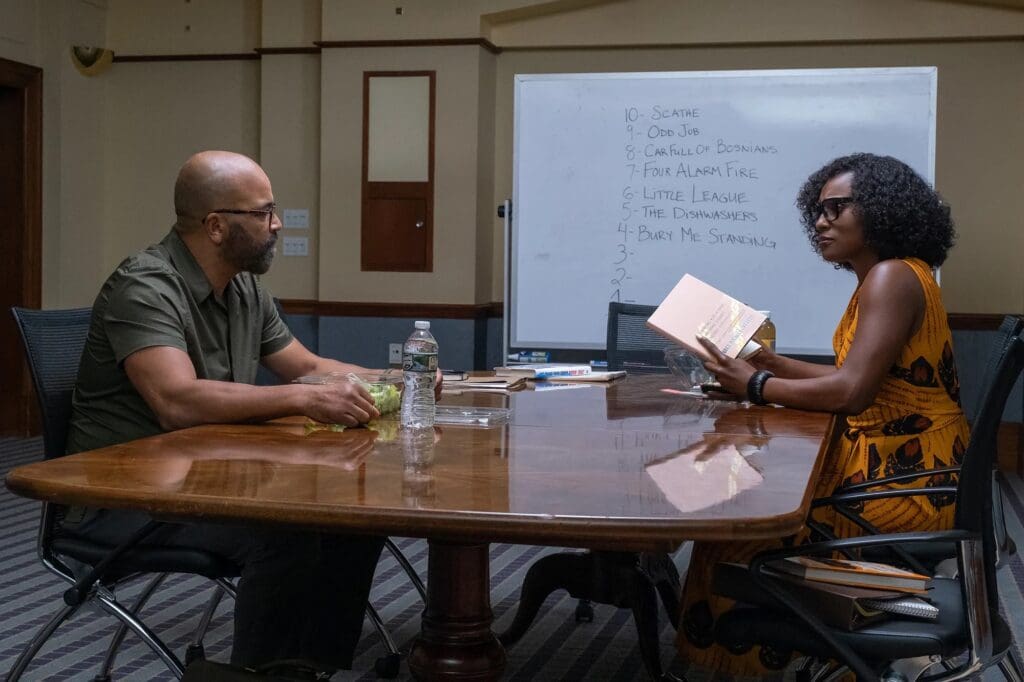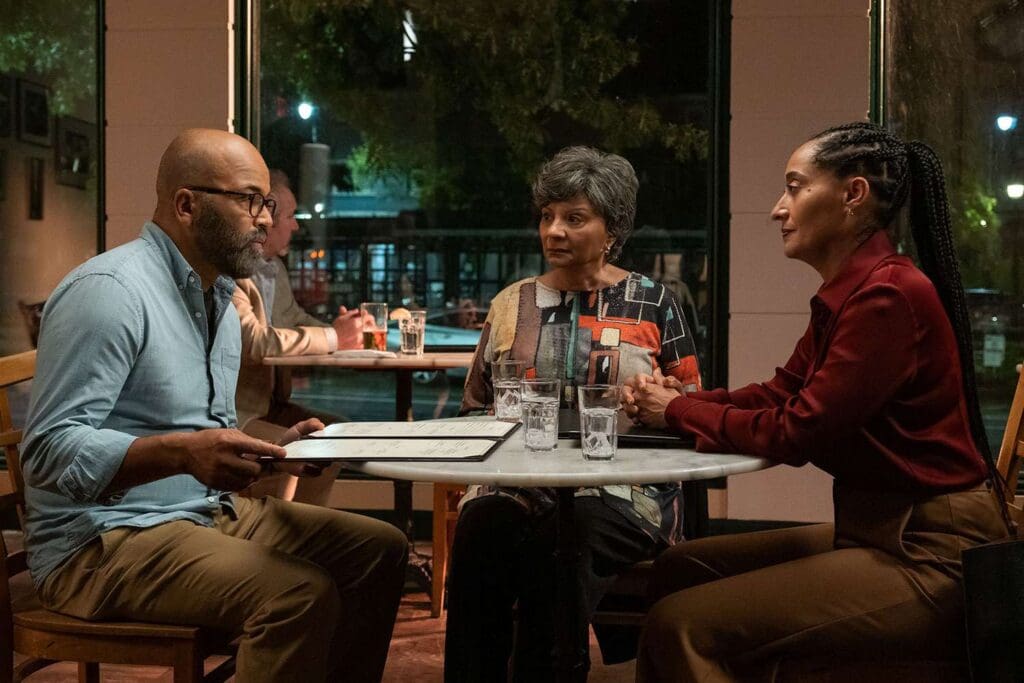Share this
Thanks to the wonders of social media, reading and trending books is on the rise again with BookTok and BookTube encouraging readers and providing a wide variety of recommendations. With that comes an increased desire for diverse stories from equally diverse authors, specifically those which represent audiences whether they be queer communities or perhaps communities of color. But what happens when some expect specific types of stories from a marginalized author only to be massively disappointed that it isn’t the traumatic experience they expected? What happens when authors decide to cater to readers out of necessity or a need to stay connected to their culture? Cord Jefferson’s Oscar nominated film, American Fiction explores these exact questions and topics.
Read Also: Oscar Nominations 2024: Full List Of Nominees Led By ‘Oppenheimer’ & ‘Poor Things’
American Fiction, which is based on the novel “Erasure” by Percival Everett is centered on the character of Thelonious “Monk” Ellison, an author and an academically praised professor. However, despite having written numerous books, most if not all of them do not sell well due to the fact that while they center Black characters, they don’t fit the public’s expectations of what is considered a “genuine Black story”. While trying to trick the industry by writing a book that feeds into people’s limiting demands, Monk is also reunited with his family under less than fortunate circumstances. The film stars Oscar nominees Jeffrey Wright and Sterling K. Brown, alongside Tracee Ellis Ross, Issa Rae, Erika Alexander, Leslie Uggams, John Ortiz, and Adam Brody.

When it comes to American Fiction, it is a near-perfect split story that is about managing family grievances as well as confronting the questionable expectations of readers. One on side, you have a man who is grieving with his family and trying to reconcile differences. In the process, he begins to question his own role in the family and his understanding of what’s left while also seeing himself in a romantic relationship. On the other side, he is frustrated with the publishing industry and the way they cherry pick stories to highlight and promote over others. While his books are intelligently written, they are simply not what audiences claim to want.
And that is where the film brings up excellent points in the publishing industry that we typically have only seen when it comes to the film and television industry. There is a certain level of trauma that is expected from stories that are written by and are about people of color. With that comes an odd necessity to indulge in feelings of guilt when witnessing the traumas of marginalized groups, whether they be presented as a book, a film, or any other medium. American Fiction questions this need from readers, even highlighting the terminology used to describe such books: “real” and “raw”.

That isn’t to say that unleashing the reality of people’s lives isn’t beneficial, and in more ways than one, it can be educational or eye opening. But the film approaches another relevant question: Is it worth sacrificing the stories we want to tell solely for the purpose of writing stories that the audience wants to read? Are we selling out when we create something that will get so much more critical acclaim for indulging in the trauma of our people?
With American Fiction being in the perspective of a middle-class author trying to branch out in his writing, this can be seen as stepping away from one’s background or distancing themselves from the circumstances they grew up in. To a degree, it’s a valid understanding of Monk’s character as he desperately tries to prove a point to everyone about the standard of diverse books that are expected of authors of color. However, Cord Jefferson writes this character expertly to where it isn’t just about separating yourself from your community while othering them. It’s also essentially trying to stop a cycle of being trapped in a box regardless of what you do as an artist. If it doesn’t fit the narrative, if it doesn’t feel “raw and real”, if the story doesn’t make me feel absolved of our guilt by reading it, why would anyone care?

But that isn’t the only side of American Fiction to focus on, albeit it is portrayed hilariously. What is also displayed so well, courtesy of the talents of the cast, are the whirlwind of emotions when tragedy strikes in our personal lives. It isn’t all gloom and doom, and in fact sometimes, it can lead to bringing families back together, moments of laughter and looking back on memories, or even new romances. Not only is Monk navigating through a brand new relationship, but he also has to suddenly manage his family, a role he neither wants nor cares to have. This is exactly how it becomes evident that Monk’s actions of the past were indicative of him stepping away from his identity and what his family represents. But even so, the film also looks at how families interact when the one person who held the family together is now gone. And when you throw in other factors like acceptance of one’s identity or grappling with health conditions, it can be a rocky experience. The film acknowledges that it isn’t as clear cut as one would hope, and as it would turn out, it’s rather messy and heartbreaking.

It’s obvious why Cord Jefferson’s American Fiction is a contender at the Oscars this year. The script is engaging and hilarious, balancing two storylines while opening the floor to discussing very laughable yet very real (and raw) struggles, whether they pertain to personal grievances or professional ones. Jefferson does not waste time in diving straight into the primary themes of the film and is not held back by his cast either. With talent like Jeffrey Wright, whose dry humor makes the viewer do a double take, and Sterling K. Brown, whose performance is openly funny but quietly melancholic, it’s hard to ignore the brilliance of the film. Other cast members like Tracee Ellis Ross, Issa Rae, Leslie Uggams, and Erika Alexander also provide the proper support to the film’s story and messaging, each giving additional context to Monk’s character and his role within their lives.

At its core, American Fiction speaks volumes about the way so many of us feel the need to keep distant from our past which includes any identities we attached ourselves to at one point. Even though we may have “made it” in life, it can often be at the cost of our identities and what we stand for. The film also simultaneously addresses what it means to be trapped in one box, and finally getting out, only to be trapped within another box. How we choose to confront the expectations that society and audiences across the board have for us is what ultimately determines the path we are pushed into, but neither path is with its internal conflicts both in personal and professional settings. And it’s because of this that the film manages to be both hilarious, emotionally gutting, and incredibly relevant. Overall, American Fiction is well-worth the watch as it calls out the hypocrisy and off-putting environments of an industry that wants us to think out of the box while trapping us in a box.
Samosa Rating:
American Fiction receives 4.5 out of 5 Samosas.
American Fiction is currently playing in theaters.
Runtime: 1h 57m
If you want even more film discussions, reviews, or just some good old recommendations, be sure to follow @samosasandpopcorn on TikTok!


